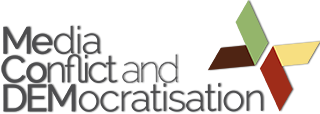A literature review by Nebojša Vladisavljević on media framing of political conflict is now available.
Download at: http://www.mecodem.eu/publications/working-papers
Executive Summary
The paper provides a critical overview of the literature on media and conflict by focusing on the ways in which contemporary media frame different types of political conflict. It reveals a fractured field. There is an extensive literature on how media report on wars, on election campaigns and popular protest and social movements in western democracies, as well as some research on media coverage of violent conflicts in non-democratic regimes and democratising states, but there are only limited attempts to draw parallels between the media coverage of different kinds of conflicts and little cross-fertilisation of findings from the disparate literatures.
- Much of the literature discusses the ways in which western media frame foreign conflicts and domestic election campaigns and policy debates, while there is considerably less focus on the media framing of domestic conflicts in non-western settings, such as those that arise during and after transitions from non-democratic rule.
- Several authors claim that reliance on existing models of media and conflict in established western democracies may be misleading in the study of non-western, transitional settings. They therefore call for developing new theories that are more suitable to discern the role that media play in democratisation.
- In contrast, this paper identifies arguments and hypotheses from the existing literature for further exploration in the study of media framing of political conflicts – such as those on citizenship, elections, transitional justice and distribution of power – in transitions from authoritarian rule and in new democracies, which are at the centre of the MeCoDEM project.
- Media coverage of political conflict can only be understood in context. Several dimensions of
the political context matter in this respect, such as regime type, international (foreign) or domestic perspectives, the degree of elite consensus, the degree of policy uncertainty, whether or not a conflict takes place within an institutionalised setting, and the stage of democratisation. Also, the literature suggests that media framing influences political outcomes, for example the decisions made by policy makers, the strategic choices of collective actors or popular responses to conflicts.
